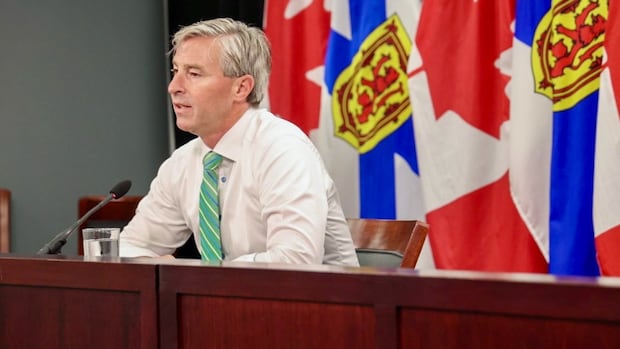Nova ScotiaNova Scotia Premier Tim Houston says the province may be facing some financial difficulty at the moment, but the public should not be concerned that the budget deficit is on pace to top a billion dollars for the first time ever.Tim Houston says he remains bullish on the province’s economic prospectsMichael Gorman · CBC News · Posted: Sep 24, 2025 9:36 AM EDT | Last Updated: 3 hours agoNova Scotia Premier Tim Houston says he has no plans to bring in austerity measures, despite a growing provincial deficit now forecast to top $1 billion. (Jeorge Sadi/CBC)Nova Scotia Premier Tim Houston says the province may be facing some financial difficulty at the moment, but the public should not be concerned that the budget deficit is on pace to top a billion dollars for the first time ever.”Nova Scotians should feel confident that they have a government that understands the needs of Nova Scotians and is willing to invest in them,” Houston told reporters at Province House on Tuesday.Houston was commenting the day after Finance Minister John Lohr released the first update of the 2025-26 budget, an update that showed the projected deficit has grown from $697 million when he tabled the document in February to $1.2 billion using the most recent available data.Despite being on pace for what would be record deficit, Houston said he has no plans to make cuts or bring in austerity measures. He said such approaches used by past governments are what led to underfunding for the health-care system and the need for the record investments the Progressive Conservatives have made since coming to power in 2021.”We’re investing in health care,” he said, adding that he’s been clear even before he became premier that doing what’s necessary would take time and cost a lot of money.”This is the reason why the Liberals didn’t deliver health care, because it’s expensive.”Indeed, the fiscal update on Monday showed that health-care spending continues to climb — now consuming 46 per cent of the budget — and over-budget spending by the Health Department was one of the notable contributors to the negative swing in the deficit.NDP Leader Claudia Chender said the Progressive Conservatives have made a habit of tabling budgets that become “meaningless” in a matter of months because of additional spending that gets approved by the government after the budget has been passed.NDP Liberal Claudia Chender says the public is not seeing the kind of benefits that should come from the government’s record spending. (Daniel Jardine/CBC)The PCs have repeatedly tabled deficit budgets, only to end the fiscal year in a surplus thanks mainly to booming population growth and the related economic spinoffs.That seems less certain this time, given factors such as plateauing population growth and Chinese tariffs on Canadian seafood products.Chender said it seems like the public is not getting the benefits that should come from the record spending by the government.”If they believe that that is money that needs to be spent to make people’s lives better, well, we’d better see people’s lives getting better and right now that’s not what we’re hearing.”Interim Liberal Leader Derek Mombourquette said the growth in the deficit is cause for concern, and he called on Houston to consider program reviews with an eye toward sustainable spending that will not further increase debt on future generations.Mombourquette said the Liberal governments he was a part of made investments, “but we were also very responsible with the finances of the province because of the future.””We’re now in a situation where we have a historic deficit. The government obviously has no plan to address it at this point,” he told reporters.While the Liberals under former premier Stephen McNeil made a point of tabling and sticking to balanced budgets, it came at a cost.Interim Liberal Leader Derek Mombourquette says the government must reassess its spending priorities, given the growth of the deficit. (Daniel Jardine/CBC)Those governments repeatedly fought for organized labour as they imposed wage restraint across the public service and there was an absence of meaningful investment in sectors such as long-term care.Indeed, it was the perceived impact of that fiscal restraint on the health-care system that helped Houston and the PCs knock off the Liberals and form government in 2021.There has been little talk about balanced budgets since.Houston said looming natural resource development projects such as a new recently approved gold mine, along with the prospects of offshore natural gas and offshore wind development will lead to “significant financial impacts and revenue generation way into the future for our children and grandchildren.”But Mombourquette argued that the major payoff from those projects is years away. In the case of offshore wind, the province has yet to receive a commitment from the federal government to share the cost for things such as a transmission line to get energy to land.In the meantime, said Mombourquette, the PCs are driving up the debt.ABOUT THE AUTHORMichael Gorman covers the Nova Scotia legislature for CBC, with additional focuses on health care and rural communities. Contact him with story ideas at michael.gorman@cbc.ca
N.S. premier says ballooning deficit won’t change government spending plans











